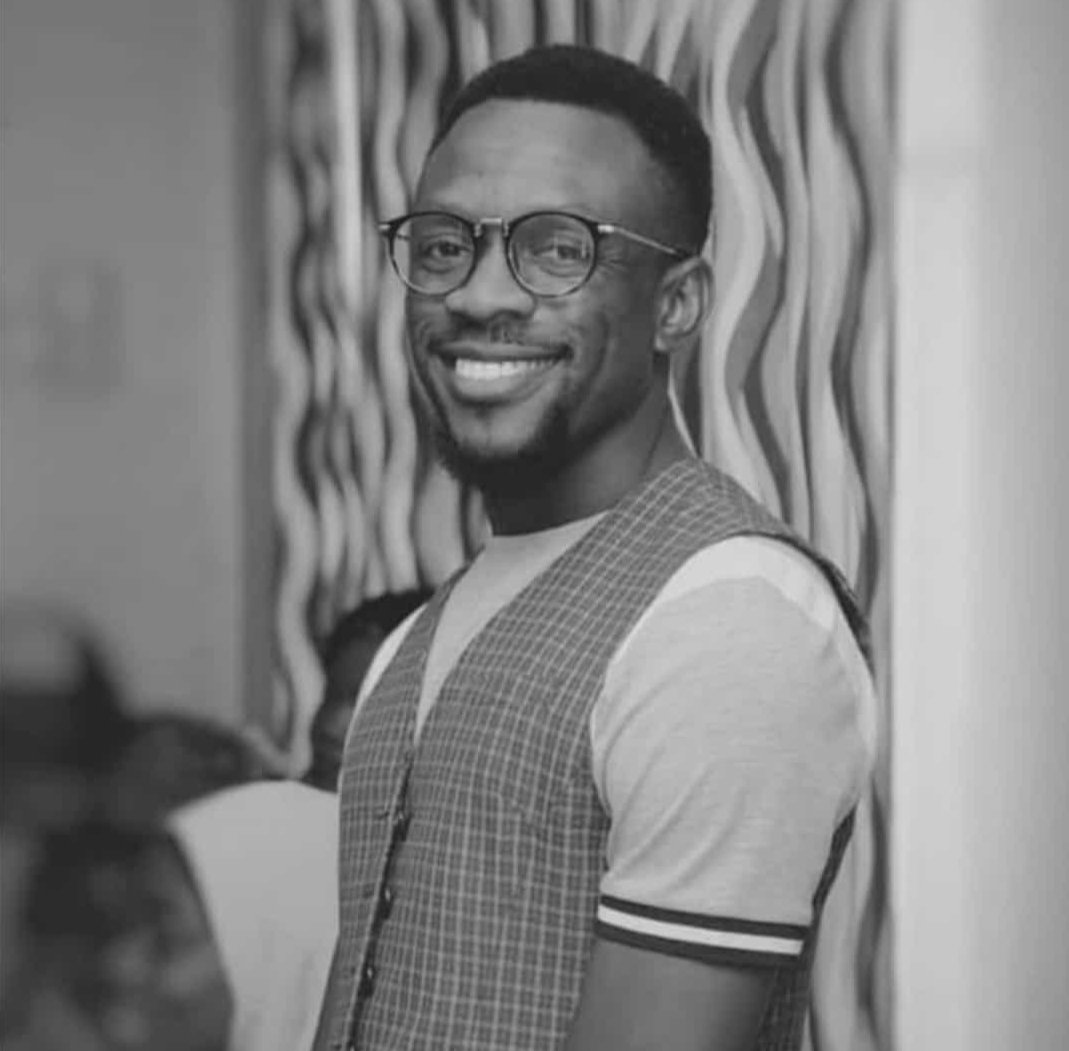To the Woli Who Read My Brother's Future

The story going round then was that there were men who used scripture from the Bible and ayah from the Quran to conjure their work, to deliver people from their misfortunes. The men called themselves Messengers of God. They lined their eyelids with tiro, smooth as soot. They could see into the lives of strangers through the haze of a busy street, in an overcrowded market, at the motor park. No one knew how they selected the people whose lives they read. Stories about them were mostly the same, in all parts of the country. Just be careful, parents advised their children.
Before my brother left Maiduguri for the Southwest to do his one-year mandatory service to the nation, mother warned him to stay out of trouble. That included staying away from men who wore white flared robes cinched with red or purple flannel. Men who clutched big Bibles to their chests and chimed small, gold-colored bells, evangelizing.
But you’d met my brother looking like a professor who spoke the Queen’s English.
It was the late nineties. There were no mobile phones or internet. My brother, far-flung in the Southwest, only communicated with home in Maiduguri with letters through the postal office address where father worked. He’d write often, telling father and mother how the Southwest was treating him, the new food he was learning to cook and eat. In a separate letter to us, his siblings, he'd talk about the girl he was dating and how he was thinking of settling down there after service. He didn’t visit home during the holidays. He never mentioned you in his letters. Not because you’d told him not to tell anyone, typical of men like you, but because your presence was harmless: You weren’t a fraud, the type of fraud mother had warned him to flee. The type that went about smelling like the wax of a scented candle or incense that itched the throat.
You'd met my brother—young, in his early twenties, and curious about what life had laid out for him—as he approached the gate of the community high school where he taught junior secondary math. You were neatly dressed in a blue safari suit and black-rimmed glasses, your beard trimmed to a stubble, your hair full like Wole Soyinka’s. To my brother, you appeared to be a man with a great career who could get him a job after his service, the large hope of every young Nigerian fresh out of the university. You smelt his desperation as though it had gone rancid in the air. He was late for work, he'd said, but you'd told him work could wait, that the message you had for him was urgent. Almost immediately, you had his undivided attention.
“You told him that he would lead a life so miserable he’d contemplate killing himself. Was that what he wanted?”
You gazed through his life in a flash, past and present, and reeled it off. He'd failed physics in his senior school certificate examination, you'd told him: the reason why he was denied an engineering major in university. He had a passion for music and had once auditioned for a talent hunt show, you'd said. You recounted his failures and dreams as though you were leafing through the file of his life.
His future, you said, loomed above him like a sky thick with dark clouds. You told him he wouldn’t secure a job for long after he’d completed his service. That the girl he was currently dating would leave him for another successful man. That he would keep failing at opportunities the way he’d failed at the talent hunt show. That he would lead a life so miserable he’d contemplate killing himself. Was that what he wanted? You asked. My brother, terrified of and threatened by this gloom, replied no. Was he willing to do as he was told? He nodded, still wondering how you, a stranger, knew so much about him.
You didn’t demand money. And this was another reason why you didn’t wake my brother's suspicion. He’d heard about men who went about proffering unsolicited solutions to the misfortunes of people they encountered only to rip them off. When he offered you some cash, you rejected it. Told him you were only doing the Lord’s work. As promised, days after first accosting him, you gave him the work that would bring good luck his way.
A plastic bottle of olive oil the size of cough syrup. In it was a thick, wooden crucifix, its sides engraved with tiny shiny beads; my brother wondered how you had placed it inside the narrow-mouthed bottle. A moist black soap wrapped in foil paper and a dry sponge weaved like a bird’s nest. Like a pharmacist prescribing drugs, you'd told him how to use the work.
He must dip his index finger in the oil and use it to cross his forehead every morning before leaving the house. He must bathe with the soap and sponge every evening before going to bed. When he has exhausted the soap, he must burn the sponge to ash and trash it somewhere desolate.
For weeks after you’d given him the work, you often met him at the school where he taught. You asked how he was feeling since he started using the work you prepared for him, and urged him to use it if he hadn’t. Once, you told him to remember the calamity that would befall him in the future if he didn’t take care of his future now, in the present. If he didn’t use the work. Your words haunted him in his sleep and in the classroom.
Troubled by this thought of failure in life and stress from work, he fell ill. He took an exeat from service and came home one July evening, the work tied in a black nylon bag. After showing father and mother, I remember the horror that spread on their faces because it remained lodged in the corners of mother’s eyes long afterwards. I remember mother flinging the black nylon through the door that led to the backyard, muttering prayers, setting it on fire, the dry sponge burning in bright red flame. My other older siblings scolded him for revealing you to my parents. They were surprised that he had a shot at having his dreams become reality through your help, yet he blew it.
Father followed my brother back to the Southwest after he’d recovered from his illness to change his place of primary assignment. Five months later, he finished his service and left everything behind in the Southwest, including the love he’d met, the new life he’d started.
Back in Maiduguri, my brother and his friends discussed you as though you were a breeze that had fleetingly ruffled clothes on the washing line outback. Although they’d heard about men like you, my brother’s encounter with you only made it more real, beyond the stories they’d heard. They wondered, out loud, if you were a cult member who wanted to initiate my brother. If you’d seen how great my brother’s future was and you’d planned to steal his destiny; had my brother used the work, they’d said, he’d have lived a miserable life, and only death would’ve put him out of that misery. They called you Woli, prophet, and laughed you off, my brother’s laughter the loudest, even though your voice still haunted him.
Six years old then, I’d imagined you more as an angel with a magic wand. I wished you’d appear to him in Maiduguri and hand him a new work that’d bring him happiness. That’d make him giddy again; he was the light of the house, a lightness which dimmed whenever things didn’t work the way he wanted. In the months that followed, he struggled for a while to gain employment after service, and expressed regrets to us, his siblings, for leaving his love and the new life he’d started in the Southwest. If your premonition had stolen that life from him, I thought you could give that light back.
“I remember mother flinging the black nylon through the door that led to the backyard, muttering prayers, setting it on fire, the dry sponge burning in bright red flame.”
You remained with us, with him, within the recesses of our minds. We knew this because occasionally, mother would invite purveyors of prayers to pray for my brother before he went for job interviews. We the siblings would surround him, praying for kind interviewers, a good job, and good fortune. It isn’t in response to that man's messages, mother would say of you, just to pray for goodness.
Goodness did come my brother’s way, eventually. He married, had kids, pursued and grew an enviable career, lived. But even now, years later, he still receives his good news with you lurking behind him, perhaps reminding him that the good things he has come to possess could wither anytime.
Once, I told a colleague about my brother's encounter with you and he said, That man could be dead now, you know. I know. But I prefer to think of you alive. I think of you now the same way I thought of you as a child: magic, angelic, able to dispel dark clouds of misfortune, able to return light.
About the Author
Olajide Omojarabi works for a nonprofit that provides quality education for children in underserved schools. He's currently working on some short stories he's abandoned for years now. His most recent essay was published in Guernica. He occasionally tweets @Olareel.
Read Olajide’s “Behind the Essay” interview in our newsletter.
Edited by Claudia Crook.
Header photo by Maximal Focus.











